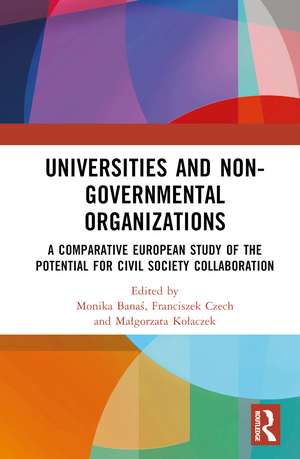Universities and Non-Governmental Organisations: A Comparative European Study of the Potential for Civil Society Collaboration
Editat de Monika Banaś, Franciszek Czech, Małgorzata Kołaczeken Limba Engleză Hardback – 16 mai 2024
The Introduction and Chapters 6, 7 and 13 of this book are freely available as a downloadable Open Access PDFs at http://www.taylorfrancis.com under a Creative Commons [Attribution-Non Commercial-No Derivatives (CC-BY-NC-ND)] 4.0 license.
Preț: 934.94 lei
Preț vechi: 1027.40 lei
-9% Nou
Puncte Express: 1402
Preț estimativ în valută:
179.06€ • 184.48$ • 149.100£
179.06€ • 184.48$ • 149.100£
Carte disponibilă
Livrare economică 01-15 februarie
Livrare express 21-25 ianuarie pentru 30.61 lei
Preluare comenzi: 021 569.72.76
Specificații
ISBN-13: 9781032420929
ISBN-10: 1032420928
Pagini: 240
Ilustrații: 6
Dimensiuni: 156 x 234 x 21 mm
Greutate: 0.45 kg
Ediția:1
Editura: Taylor & Francis
Colecția Routledge
Locul publicării:Oxford, United Kingdom
ISBN-10: 1032420928
Pagini: 240
Ilustrații: 6
Dimensiuni: 156 x 234 x 21 mm
Greutate: 0.45 kg
Ediția:1
Editura: Taylor & Francis
Colecția Routledge
Locul publicării:Oxford, United Kingdom
Public țintă
PostgraduateCuprins
Introduction Part 1: Part I: UNI-NGOs in the Context of Civil Society – Research Theory and Methodology 1. When David Meets Goliath: How Universities and NGOs Collaborate 2. The Power of Cultural Heritage: Civil Society and UNI-NGO Cooperation in the Light of Existing Research 3. Great Divide or the Great Misunderstanding: How Academia and NGOs See Each Other Part 2: Stability, Dynamics, Imbalance: The Realities of Universities and the Third Sector in Poland 4. University as a Collaborator: Academia in Co-Operation with Society 5. The Third Sector in Poland: Legally Defined, Socially Unfulfilled 6. Culture and the University’s Third Mission: NGOs as a Natural, but Unappreciated Partners? 7. Bureaucratic Ivory Towers? Co-Operation with NGOs from the Perspective of Academia Part 3: European Models of Cross-Sectoral Co-Operation in Comparative Perspective 8. Davids and Goliaths’ Cross-Sectoral Co-Operation: A European Perspective 9. Practical and Efficient Above All: Austria 10. Multicultural Mosaic as a Strength: Portugal and Poland 11. Heritage as a Tool: Slovakia 12. Students at the Forefront – Culture as Co-Operation: Great Britain Part 4: The Future of University-NGO Cross-Sectoral Co-Operation: Conclusions 13. Where To Go From Here: Research Challenges and Recommendations
Notă biografică
Monika Banas ́is Professor at the Faculty of International and Political Studies at Jagiellonian University in Krakow, Poland. Her research focuses on culture, politics and their mutual dependencies. She has published on migration and integration policies, political culture and political symbolism. Her works include: Protest in Late Modern Societies. Dynamics, Forms, Futures (co-editor Ruslan Saduov), Routledge; Integration Policy as a Challenge for European Cohesion in Politicke Vedy, Swedish Migrant Integration Policy After 2015: A Revised Approach in the Shadow of the Migration Crisis in Fuori Luogo. She is the Chief Editor of the academic journal Intercultural Relations.
Franciszek Czech is a University Professor, sociologist and political scientist at the Faculty of International and Political Studies, Jagiellonian University, Cracow. His research interests include analysis of public discourses, political culture and civil society. He performs various administrative functions at the university, and in addition he has experience of collaboration with various non-governmental organisations. He is the author of two books, numerous articles and reports. He currently sits on the Advisory Board of the ERC-funded project “Populism and Conspiracy Theory (PACT)”. His most recent article is Links Between Conspiracy Thinking and Attitudes Toward Democracy and Religion: Survey Data From Poland ("Politics and Governance”).
Małorzata Kołczek, PhD, political scientist, is deputy director and Assistant Professor in the Institute of Intercultural Studies, Jagiellonian University. She is co-founder of Foundation Towards Dialogue and book review editor for Romani Studies. She is the author of Ethnic Mobilization of the Roma and the European Union. Poland, Slovakia, Hungary JUP 2014 and co-author of Direction: Future. 25 Years of Freedom and the Roma People JUP 2018 and Cooperation Between Universities and NGOs as Civil Society Animators Using the Potential of Cultural Heritage KA 2019. For 20 years, she has researched topics regarding the Roma community: ethnic mobilisation, socio-political situation and media coverage of Roma minority.
Franciszek Czech is a University Professor, sociologist and political scientist at the Faculty of International and Political Studies, Jagiellonian University, Cracow. His research interests include analysis of public discourses, political culture and civil society. He performs various administrative functions at the university, and in addition he has experience of collaboration with various non-governmental organisations. He is the author of two books, numerous articles and reports. He currently sits on the Advisory Board of the ERC-funded project “Populism and Conspiracy Theory (PACT)”. His most recent article is Links Between Conspiracy Thinking and Attitudes Toward Democracy and Religion: Survey Data From Poland ("Politics and Governance”).
Małorzata Kołczek, PhD, political scientist, is deputy director and Assistant Professor in the Institute of Intercultural Studies, Jagiellonian University. She is co-founder of Foundation Towards Dialogue and book review editor for Romani Studies. She is the author of Ethnic Mobilization of the Roma and the European Union. Poland, Slovakia, Hungary JUP 2014 and co-author of Direction: Future. 25 Years of Freedom and the Roma People JUP 2018 and Cooperation Between Universities and NGOs as Civil Society Animators Using the Potential of Cultural Heritage KA 2019. For 20 years, she has researched topics regarding the Roma community: ethnic mobilisation, socio-political situation and media coverage of Roma minority.
Descriere
Focusing on legal, cultural and socio-economic factors, this volume considers the reasons for which institutions of higher education and NGOs fail to cooperate as frequently and effectively as one might expect, comparing the Polish case with the landscape for collaboration in other European countries: Portugal, the UK, Slovakia and Austria.
